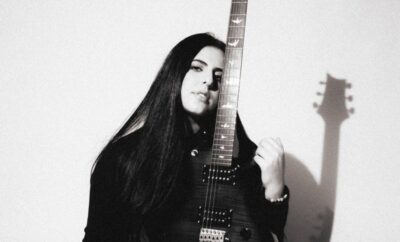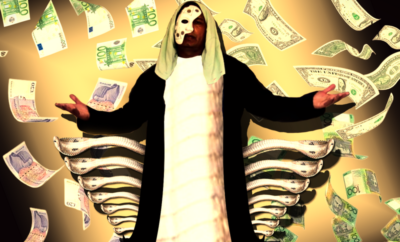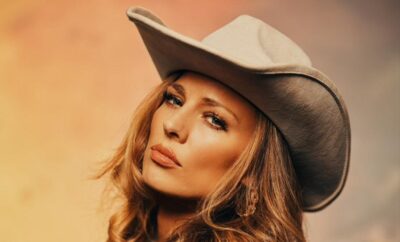
Interviews
Charlee Remitz – Garden
By: Jamie Steinberg
Q) How would you describe your sound?
A) I get a lot of comparison to Lana Del Rey. A sort of ambient, indie pop. Lyrics that both romanticize and villainize love. But I long to create a sound that could be used in the ending credits of some feel-good YA novel adapted to screen for Netflix. I’d love to have an album that is genre-bending and versatile enough to be the sole composition for that type of coming-of-age story.
Q) Who are some of your musical influences?
A) I mean, I adore Taylor Swift for her work ethic and her compassion. She knits together a room of 19,000 gracefully, as though it were a small birthday party, and it takes a willpower many don’t venture to possess to do that. John Mayer does the same thing with his lyrics. He proves that we are all similar and still unique in our own sweet dispositions, that at any given moment (no matter the widening loneliness) you can turn to song and remember that there is still someone else out there who feels a parallel melancholy. And then you have bands like Tears for Fears and Foster the People who draw a universe you can escape to with each song. And, of course, Elton John, the king of metaphor, and Coldplay, a sonic constellation.
Q) Talk about the story behind your new song “Nothing Blooms Quite Like a Heartache.”
A) Four days after my ex and I separated, I bought a small plant to replace the guitar he often played that, once upon a time, sat in front of my bedroom window. After he left, I really couldn’t bear to look at it, waking up every morning with it right there feeling like it no longer belonged to me. I dragged its case out of the closet, sealed it up and moved it into my guestroom where it sat for months before I decided to reconnect with it. But after I did, there was like a gaping hole in its place.
I had resigned myself to laying on the couch all day, reading articles on the internet about getting over heartbreak as quickly and seamlessly as possible. To be very honest, no article ever got it. But there were a few that suggested learning things and caring for things. So, I purchased a harmonica and, in an almost ritualistic manner, found myself at this tiny store in Los Feliz picking out a plant. Anot just the plant, but its base, the rocks and soil it would sit in.
It wasn’t immediately obvious, but somewhere in the coming months it came to me that this plant was a metaphor for healing. Healing—it’s not immediately obvious, especially when you’re the one doing it. You don’t notice incremental growth the way someone might if they haven’t seen you in a couple months. Or the way you might if you take pictures and space them out long enough to compare. But the entire time, when you’re convinced you’re dying of a broken heart, you’re actually growing. You’re healing. Whenever you choose to abandon the desire to outrun it you choose to take a step forward.
You, in essence, plant the heartache in the ground and you pay attention to it. You don’t push it into the dark and pretend it’s not there. You don’t find a prettier plant to put in its place. You just believe in this seed like you’ve never believed in something before. You believe in its ability to bloom. And then, when you’re sick of the up and down and the back and forth and you’re ready to give up, it pushes its way into the world and you realize nothing blooms quite like it. Nothing blooms quite like a heartache.
But back to my plant. It’s a jungle these days. I kind of don’t know what to do with it.
Q) What do you think it is about the song that fans connect to?
A) Heartbreak is universally known for its detriment. I’ve never seen two people band together like they would when they’re both hurting in similar, confusing ways. I remember my friend Chase and I were kind of going through it together. Some days he was up and I was down and some days I was up and he was down and there was something hopeful in that dance we did together. Like, yes, there was a lot of hurt and ache but there was also this understanding between us, this magnetism between our hearts, when one wasn’t beating the other seemed to know why.
It’s a miracle to be divined by someone else when you don’t know who the hell you are anymore.
Q) How does the video for the track play into the message behind it?
A) I can’t give that away QUITE yet. But I will say this; it shows two sides of heartache.
Q) What is your song writing process? Do you need music before you can create lyrics?
A) Sometimes it can begin with just a title. Having synesthesia means getting an entire landscape out of one word or phrase. But, more often, it begins with the instrumental. I’ll pick out blue, dissonant chords and then start the writing process with the chorus. The chorus is the most important part of the song, so why wouldn’t you start there and shape everything else around it? Rarely is it the frame that catches the viewer. But in the cases of “Valley Tantrums” (mine) and “Head Over Heals” (Tears for Fears), the frame does almost outshine the piece inside. Happy accidents, I suppose.
Q) How much of hand do you have in the production of your music?
A) On Saints Until Fridays and Bright White Trims, I was a puppet master. On Sad Girl Music, I was mostly uninvolved. On These Veins, my first project, and Garden, my most recent, I was the sole manufacturer. Irony.
Q) What can fans expect from a live Charlee Remitz performance?
A) I am the biggest Bruno Mars fan when it comes to a live performance. I like the laid back, cool boy choreo and the camaraderie he has with his backup singers. They’re elemental to the production. Rather than just being nameless pieces of the chorus, they have a hand in the action. That’s what fans can expect from a live performance. Camaraderie.
I also tell a lot of jokes.
Q) What was the inspiration behind the title of your album Garden?
A) After I wrote “Nothing Blooms Quite Like a Heartache,” it was just kind of obvious that the album should be called Garden. Both professionally and personally I had grown so much in so many different ways—it wasn’t just a few flowers I had tended to, it was an entire grove of heartache and frustration and rejection I grew into a wild, unconstrained garden.
Q) What songs off Garden can you tease that are you looking forward to performing live?
A) “Brad Pitt’s a Sad Girl Too” is a fun one. I ended the album with it and I’ll end shows with it. It really is that conclusive, ending credits song. I want fans to walk away from a show singing it in their heads.
Q) What has been your favorite part of the process for getting Garden out there? Recording? Promotion? Performing?
A) I loved producing this album. I found out I’m good at it.
Q) What do you hope listeners take away from listening to your Garden as a whole?
A) I really want listeners to stream it in its allocated order because there’s a message in there that you can only fathom if you haven’t skipped ahead to the finish line. And like healing, the album shouldn’t be rushed. If it is, you miss out on that feeling of contentment at the very end, the ride off into the sunset. When “Brad Pitt’s a Sad Girl Too” closes on an infinity sign, its petitionary wish for humanity to stop personalizing the impersonal.
Q) Where are some of your favorite places to perform and what makes those locations so significant to you?
A) Mostly, I love singing in my bedroom with my backup singers and guitar player. I haven’t yet fallen in love with a venue or city. But I do have this dream of doing a folky dive bar tour in little cities that have incredible local talent and rarely see big name acts. Intimate.
Q) Who would you most like to collaborate with on a song in the future?
A) And so goes day 1300 of trying to get John Mayer’s attention.
Q) What album/band are you currently listening to and why do you dig them?
A) I really love Nicopop.’s remix of Mating Ritual’s “U.N.I.” It’s easy, light and I’m a sucker for best friends who fall in love. I fell in love with my best friend once. He absolutely shattered my heart and I don’t believe in his goodness anymore, but being in love with him was one of the best times of my life.
Q) You are a part of social media. Why is that such an important way for you to connect with your fans?
A) I don’t think it is. I think social media right now is really a means of setting an example. I’m just being real, so I talk about affairs of the heart and post unedited photos (even ones I think I look unattractive in) because I’d like to get across that you can’t be anybody else. You have to be you. And if someone doesn’t like you for everything that makes you up, they don’t like you.
Q) What would you like to say to everyone who is a fan and supporter of you and your work?
A) I have really, really, REALLY dedicated fans that don’t just like the music, but they like what I have to say and I think it will always be shocking and flattering at the same time to have someone thank me for helping them through a hard time even though I wasn’t physically there. I want them to know how grateful I am to see them give enough life to my words so my words can outlive me.





You must be logged in to post a comment Login